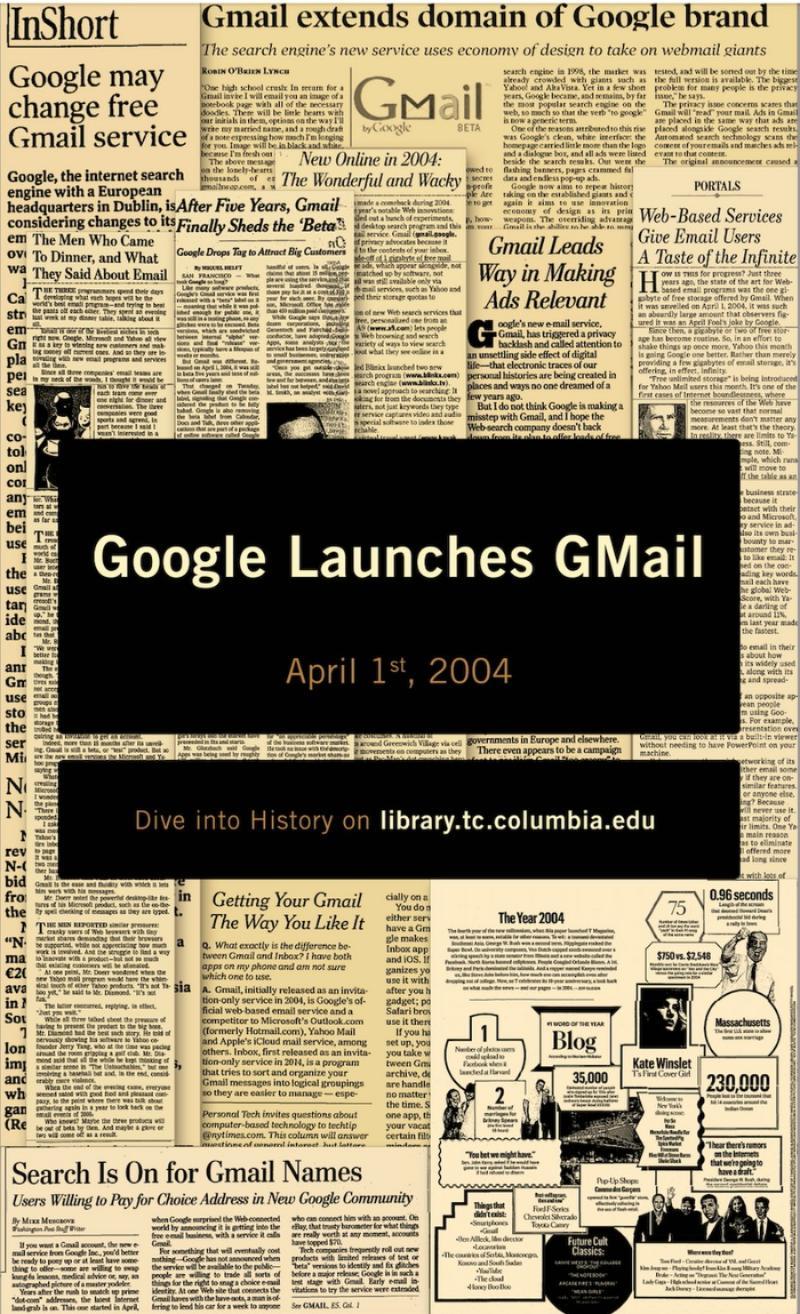Today In History: Google Launches Gmail
![]()
Seventeen years ago, April 1st, 2004 marks the day when Google launched a limited beta release a new free e-mail service. Google engineer Paul Buchheit created and developed Gmail, initially known under the code name Caribou as a browser-based email program that allowed users to easily search their own messages; his work succeeded that of Raymond Samuel Tomlinson, an American computer programmer who implemented in 1971 the first email program on the ARPANET system, which was capable of sending mail between users on different hosts connected to ARPANET.
Although there were other email services (like AOL, Hotmail, and Yahoo) at the time, Gmail initially was provided by invitation only and incorporated advertising to help fund operations; services allowed for a maximum storage capacity of just one gigabyte per person, but, due to the popularity of its use, grew to fifteen gigs, with options to send files larger than 25 megabytes via a Google drive. Beta status was exited on July 7, 2009, with the release of the final version. By 2012 Google had roughly 425 million active users across the globe, including institutions of higher education. By 2017 there were over 1.2 billion active users. Today it boasts 1.8 billion users per month and is available in 72 languages -- making it the most highly used e-mail platform.
The search bar can be used for searching emails, as well as contacts, files in the drive, events on the Google calendar, and sites in Google -- an essential tool for finding resources in an ever expanding universe of research and information. Three quarters of all users access gmail from their mobile devices, boosting communication on a massive scale. Today there are over 306 billion emails sent and received each day, due to this least expensive, most convenient, and most simple and flexible means of communication.
The following articles are drawn from Proquest Historical Newspapers, which informs and inspires classroom teaching and learning. Included are selections that illustrate the context of technology and then current affairs.
- Google May Change Free Gmail Service. (2004, Apr 16). The Irish Times (1921-)
- Walker, L. (2004, May 13). Gmail Leads Way In Making Ads Relevant. The Washington Post (1974-)
- Musgrove, M. (2004, May 21). Search Is On For Gmail Names: Users Willing To Pay For Choice Address In New Google Community. The Washington Post (1974-)
- O'Brien, R. L. (2004, Sep 03). Gmail Extends Domain Of Google Brand: The Search Engine's New Service Uses Economy Of Design To Take On Webmail Giants. The Irish Times (1921-)
- Walker, L. (2005, Jan 02). New Online In 2004: The Wonderful and Wacky. The Washington Post (1974-)
- Gomes, L. (2005, Dec 21). The Men Who Came To Dinner, and What They Said About Email. Wall Street Journal (1923-)
- Gomes, L. (2007, Jun 13). Web-Based Services Give Email Users A Taste Of the Infinite. Wall Street Journal (1923-)
- Helft, M. (2009, Jul 08). After Five Years, Gmail Finally Sheds the 'Beta': Google Drops Tag To Attract Big Customers. New York Times (1923-)
- Oloizia, J. (2014, Oct 19). The Year 2004. New York Times (1923-)
- Getting Your Gmail the Way You Like It(2). (2016, Jan 07). New York Times (1923-)

Tips:
- Davis, Yvette. Google Secrets Do What You Never Thought Possible with Google. Indianapolis, Ind: Wiley, 2011. e-book
- Fukami, Yoshiaki, and Takumi Shimizu. “Technology Standardization for Innovation: How Google Leverages an Open Digital Platform.” Information (Basel) 12.11 (2021): 441–.
- Garud, Raghu, and Arvind Karunakaran. “Process-Based Ideology of Participative Experimentation to Foster Identity-Challenging Innovations: The Case of Gmail and AdSenses.” Strategic Organization 16.3 (2018): 273–303.
- Walmsley, Andrew. “Google Is Practical, Not Evil.” Marketing (London) (2009): 13–.
Images:
- GMail Icon (2020), Courtesy Wikimedia Commons
- Special News Slide, Courtesy Gottesman Libraries
**
Need to keep current, look to the past, teach a topic? The Everett Cafe features daily postings of news from around the world, and also promotes awareness of historical events from an educational context. Be sure to check the news postings on Learning at the Library, where you can delve into history.



